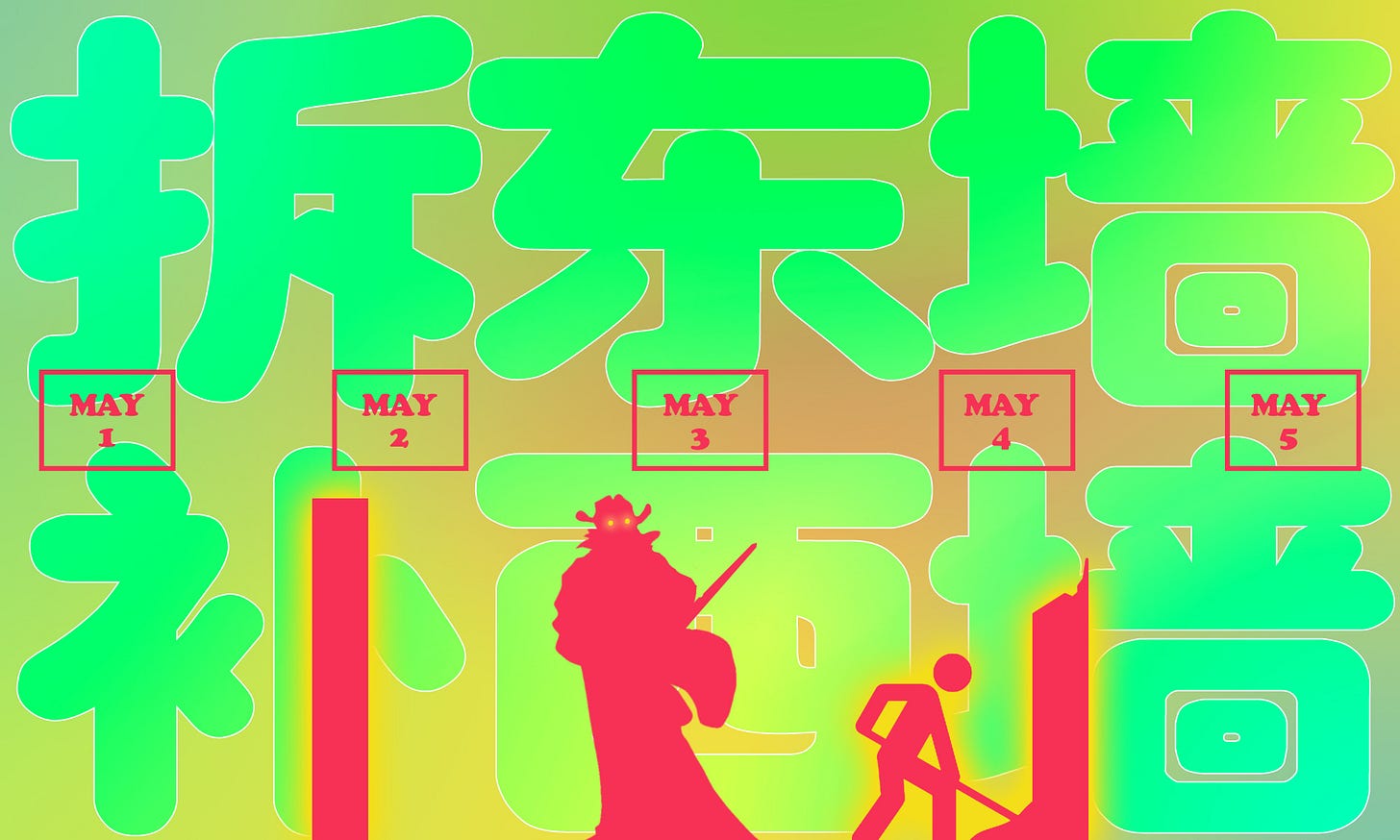"Tear down the east wall to repair the west wall" — Phrase of the Week
Labor Day holiday is mostly borrowed from weekends

Our phrase of the week is: "tear down the east wall to repair the west wall" (拆东墙补西墙 chāi dōng qiáng bǔ xī qiáng).
Context
Today is the last day of the Labour Day holiday (劳动节 láodòng jié) in China.
In the lead up to it, there was much criticism of the five-day break, and the Chinese practice of "holiday days adjustment" (调休 tiáoxiū).
National holidays in China often involve "adjusting" weekend days into working days. It's intended to extend the holiday period by aligning holidays with weekends, creating longer breaks.
This year the Labour Day holiday started on Wednesday 1st May, and ends today, on Sunday 5 May.
That’s five rest days in total. But "adjustment days" on either side of the holidays are Sunday April 28, and Saturday May 11, when people are required to work, meaning two six-day weeks to "adjust" for the time off in the first five days of May.
So not including the two weekend days in the Labor Day break (May 4 and 5), and two adjusted holidays from the two weekends before and after the holiday, workers in China actually only get one additional day of rest.
Many people are now calling for a change to the policy, which has been in place since 1999:
Whether or not to adjust holidays has caused heated discussion for many years, and it's difficult to find the right answer.
However, these debates have clearly shown: people want more holidays and they are tired of the existing practice of "tearing down the east wall to repair the west wall", i.e. borrowing weekend days to seemingly extend a holiday.
要不要调休是一个争议多年的话题,很难有绝对正确的答案。然而透过这些争议,可以听到人们的心声:人们期待更多的假期,而不是“拆东墙补西墙”的调休。
"Yàobuyào tiáoxiū shì yíge zhēngyì duōnián de huàtí, hěnnán yǒu juéduì zhèngquè de dá'àn. Rán'ér tòuguò zhèxiē zhēngyì, kěyǐ tīngdào rénmen de xīnshēng: rénmen qīdài gèngduō de jiàqī, ér búshì 'chāi dōng qiáng bǔ xī qiáng' de tiáoxiū."
And with that we have our Sinica Phrase of the Week.
What it means
"Tearing down the east wall to repair the west wall" is a colloquial phrase which translates as "tear down east wall" (拆东墙 chāi dōng qiáng), "repair west wall" (补西墙 bǔ xī qiáng).
The origin of the phrase is believed to be The Legend of Zhong Kui, the Demon Slayer (钟馗斩鬼传 Zhōngkuí zhǎnguǐ zhuàn), a novel written by Qing Dynasty author, Liú Zhāng 刘璋 around 1703.
The novel tells the story of Zhōng Kuí 钟馗, a Taoist deity in Chinese mythology, traditionally known as a vanquisher of ghosts and evil beings. Even today, Zhong Kui and his legend is a popular theme in Chinese art and folklore. Pictures of Zhong Kui are frequently hung up in households to scare away ghosts, especially around Chinese New Year.
In Liu Zhang's version of the legend, Zhong Kui is appointed as a great deity for exorcism after his death to eradicate ghosts and demons from the human realm. The story is set during the reign of Emperor Dezong of the Tang Dynasty (742-805 AD), using the folk legend of Zhong Kui slaying demons to expose and criticize societal vices and human weaknesses which Liu saw as rife at that time.
Our Phrase of the Week appears in Chapter 4:
Unbeknownst to the two of you, my western wall has collapsed. I am now tearing down the east wall to repair the west one. What else can I do?
二位有所不知,我如今西墙倒坏,我是拆的东墙补西墙,岂是有奈何的么?
"Èr wèi yǒu suǒ bùzhī, wǒ rújīn xīqiáng dǎohuài, wǒ shì chāi de dōng qiáng bǔ xī qiáng, qǐ shì yǒu nàihé de me?"
These are the words from the Demon of Late Payment (急赖鬼 jílàiguǐ), mending his western wall while ignoring creditors, who are banging on his door demanding payment. He is one of the demons to be vanquished by Zhong Kui.
This background is why in modern Chinese the metaphor is normally used to describe being financially tight, and only able to temporarily cope with immediate difficulties by paying one debt off by borrowing money from elsewhere.
In English it's often translated as the idiom, "borrowing from Peter to pay Paul".
But in the context of the "adjustment days" of China's Labour Day holiday, it is time, not money, which is temporarily borrowed from other weekends to make up the five-day break.
So we prefer to translate the phrase as directly as "tearing down the east wall to repair the west wall", or "borrowing time from the weekend to create a holiday in the middle of the week".
Andrew Methven is the author of RealTime Mandarin, a resource to helping you learn contemporary Chinese in context, and stay on top of the latest language trends in China.
Read more about how this story is being discussed in the Chinese media in this week’s RealTime Mandarin.


